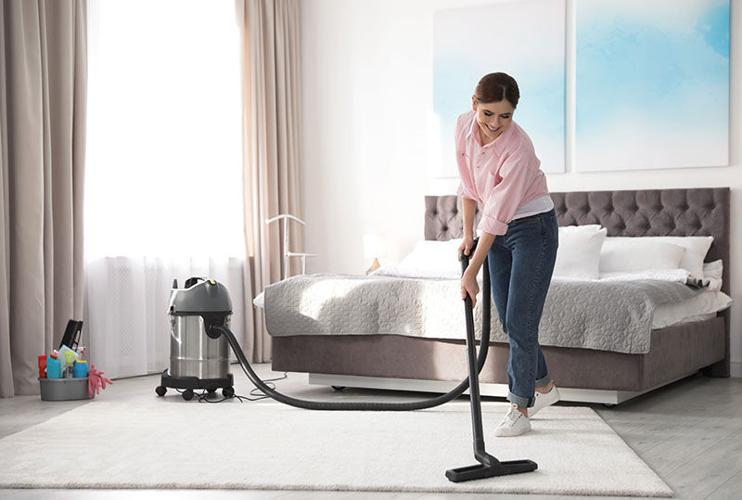
Allergies can be caused by any number of sources, from pollen and mold outdoors to common substances found in your home, such as dust, pet dander, and dust mites. The sneezing, congestion, itchy eyes and throat, and just general discomfort that come with allergies are an immune system response; essentially your body sees these harmless substances as a threat, and tries to fight them off.
Regardless of why you have allergies, and the specific ways your body reacts, the result is discomfort that can keep you awake at night and prevent you from getting adequate rest. And the fact that your bedroom is likely to be an allergy “hot zone,” so to speak, only makes things worse.
Making your bedroom less hospitable to allergens, while still keeping it cozy and comfortable for you aren’t opposing goals. And while you might not be able to keep every single dust mite or speck of pollen from your bedroom, with some smart choices in furnishings and some focused cleaning, you can make your room practically allergy-free and enjoy some restful sleep.
The Basics: Your Bed
When fighting allergens in your bedroom, the first place to start is your bed. After all, it’s where you spend the most time -- and the place most likely to be loaded with potential irritants.
Choosing a natural mattress is a great place to start toward an allergen-free space. Natural mattresses are made using organic materials, without chemicals and processes that can be harmful to your health. Also known as green or organic mattresses, this type of mattress is often made with latex (not polyurethane or any type of manufactured foams) as well as organic cotton or wool. If you have skin sensitivities, these naturally hypoallergenic mattresses can prevent discomfort. Using organic wool provides natural fire protection to the mattress (without harmful chemicals) while also providing a natural resistance to dust mites and bacteria that can trigger a reaction.
What you put on your mattress is just as important to preventing allergies. Keeping dust mites -- microscopic insects that feed on dead skin cells -- and their droppings out of your bed is key to avoiding allergic reactions. Covering your mattress and pillows with dust mite proof encasements keeps them at bay. That said, it’s also important to regularly wash your bedding to remove mites, dust, skin cells, pet dander, and sweat that build up when you sleep. Wash your sheets at least weekly; your blankets and duvets need a monthly cleaning to keep you healthy.
Cleaning Your Room

Your sheets and blankets aren’t the only things that need regular cleaning to breathe easy in your bedroom. Keeping the rest of the room clean and dust-free is also important. Look at your room with a critical eye, and remove anything that’s just a dust catcher. A clutter free space not only keeps allergens at bay, but can also help you sleep better in general.
Keeping the dust out also means:
● Using lightweight window treatments that can be easily washed, or blinds you can dust regularly.
● Not storing items under the bed, as that makes it more difficult to clean.
● Reducing carpet and upholstery in the room. If you can’t remove all the carpet, vacuum weekly, preferably with a vacuum equipped with a HEPA filter to remove allergens.
● Keeping the windows closed, so pollen and dust stay outdoors. Use a fan instead to stay cool.
● Never wear your shoes in the bedroom, and leave your dirty laundry in a hamper outside the bedroom.
Clear the Air
In addition to keeping the windows closed to keep allergens outdoors, consider using an air purifier or filtration system in your bedroom. Although houseplants can naturally rid the air of contaminants, mold can develop in the soil and exacerbate allergies, so only add live plants if you don’t have a mold allergy.
Keeping the room cool and dry can also reduce allergens, while also making it easier for you to sleep. The ideal temperature for sleep is about 65 degrees, which is good news if you suffer from allergies because dust mites don’t thrive at temperatures lower than 77 degrees. Maintaining humidity around 50 percent also helps keep mold spores from multiplying, while also keeping the room comfortable. If necessary, consider adding a dehumidifier to your space.
Allergies and Pets
You might enjoy sleeping with Fido and Fluffy, they might be making you sick. Ideally, pets should sleep outside the bedroom if you have allergies, but if that’s not realistic, you can reduce the amount of pet dander in your bedroom. Regularly bathe and groom your pets, and provide a place for them to sleep that’s in your room, but not in your bed. Only allow your pets in your room if you are there, and vacuum regularly to keep the fur at bay.
Sleeping well with allergies doesn’t mean you need to load up on antihistamines or sleep in an empty room. With the right bed and good cleaning habits, you’ll sleep comfortably all night long.



(0) comments
We welcome your comments
Log In
Post a comment as Guest
Keep it Clean. Please avoid obscene, vulgar, lewd, racist or sexually-oriented language.
PLEASE TURN OFF YOUR CAPS LOCK.
Don't Threaten. Threats of harming another person will not be tolerated.
Be Truthful. Don't knowingly lie about anyone or anything.
Be Nice. No racism, sexism or any sort of -ism that is degrading to another person.
Be Proactive. Use the 'Report' link on each comment to let us know of abusive posts.
Share with Us. We'd love to hear eyewitness accounts, the history behind an article.